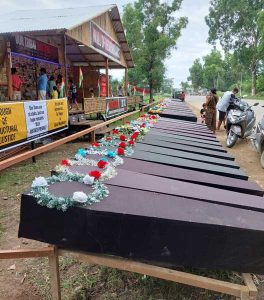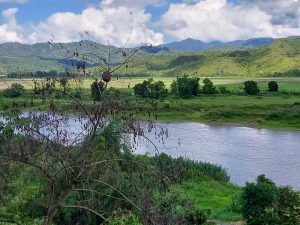Common sense tells us that all successful businesses are primarily driven by the profits they hope to earn. A possibility only in a peaceful and stable environment where law and order are not an issue. Therefore, the opening of the KFC restaurant at Churachandpur on 5th December last year, was a clear indicator that corporate honchos expected peace and prosperity to prevail in the State, as insurgency, which had lasted over five decades, seemed to have finally run its course.
There were other indicators of this as well. Earlier, from 1st April 2022, the Central Government had removed the Armed Forces Special Powers Act (AFSPA) from 15 Police Station limits, in six districts. This was followed a year later, on 24th March 2023, with its removal from four more Police Station limits; a total of 19 Police Station limits in seven districts. This implied that neither the Army nor the Assam Rifles could operate in these areas without a formal request for their assistance from the State Administration, or without a magistrate being present.
However, the fact the AFSPA had primarily been lifted from areas in the Valley, mainly dominated by the Meitei community, was not seen as important. Its significance would only be understood later as events took a turn for the worse. Moreover, cursorily this seemed logical, given the fact the tribal areas, where the AFSPA continued to be in operation, were in the close proximity of Manipur’s border with Myanmar and there was no ceasefire with the dominant Naga separatist group in the state, NSCN (IM). Following the latest notification, the very next day Mr. N Biren Singh, the Chief Minister, termed this “a historic moment achieved because of peace and prosperity in the State under Prime Minister Narendra Modi-led BJP government in Manipur.”
 But this was not wholly true because the Chief Minister had in fact, a fortnight earlier, taken the sudden and an extremely disturbing step of his government’s unilateral withdrawal from the ongoing ceasefire pact with two major Kuki militant groups, the Kuki National Army (KNA) and the Zomi Revolutionary Army (ZRA).The KNA and ZRA are among the 25 Kuki-Chin-Mizo militant groups of the State that had signed the tripartite “Suspension of Operations” with the Central and State Governments.
But this was not wholly true because the Chief Minister had in fact, a fortnight earlier, taken the sudden and an extremely disturbing step of his government’s unilateral withdrawal from the ongoing ceasefire pact with two major Kuki militant groups, the Kuki National Army (KNA) and the Zomi Revolutionary Army (ZRA).The KNA and ZRA are among the 25 Kuki-Chin-Mizo militant groups of the State that had signed the tripartite “Suspension of Operations” with the Central and State Governments.
The ostensible reason for this arbitrary action were:
• A claim, without any evidence being provided, that their leaders were outsiders from Myanmar, a narrative further strengthened by suggestions that all Kukis were immigrants. This issue of Kuki immigration has been strongly refuted by the Kuki Research Forum in their extensively researched paper on “Objective Historical Position of Kukis in Manipur”.
• The Chief Minister accused the Kukis of being responsible for poppy cultivation in the State. Obviously, poppy being cultivated in the State would be grown in the hill areas so that it is difficult to detect. However, there is also little doubt that the drugs and arms trafficking mafia has deep and extensive roots within the state. For example, mainstream media has a piece in which Ms. Thounaojam Brinda, a politician and a former police officer from the Meitei Community, has given a statement in the High Court that the Chief Minister and other high ranking police officers pressurised her to let off an arrested drug lord. She was appearing before the court on contempt charges for a tweet she put out against the court for withdrawing the charges against the arrested drug lord.
• Thirdly, a large number of Kuki tribes had taken out demonstrations in Kuki dominated areas, despite prohibitory orders, against what they termed as the “oppressive, illegal and arbitrary policies of the State Government”. This protest had been organised by the Kuki Inpi Manipur (KIM), an umbrella conglomerate of Kuki civil society and student bodies.
These demonstrations subsequently escalated when it became public on 19th April that earlier on 27th March the Acting Chief Justice of the Manipur High Court, Justice Murlidhar, had passed an order directing the State Government to decide within four weeks, on a long pending demand of the Meitei community, as to whether or not they wished to recommend their inclusion in the Scheduled Tribes List. One cannot be certain as to why the tribal responded in the manner they did, because by no means was this a done deal. It appears they either misinterpreted the court directions, or believed that the government would use this opportunity to push through this demand. In any case this was the spark that lit the bonfires that continue to rage.
As a result of the escalation of violence either due to the State Government’s deliberate incitement, or because of its sheer incompetence, though one suspects the former, the situation has now gone completely out of hand. Meitei mobs went on the rampage in Imphal and other Meitei dominated towns and villages pulling out Kuki tribals and burning their homes and churches. Many innocent lives were lost in the process with some activists suggesting over 200 men, women and children having been murdered. Reports of rape have also made headlines as have reports of retaliation by Kuki groups as well.
The importance of Kuki dominated hill districts can well be understood from the fact that Kangpokpi District controls all road access to Imphal and the Manipur Valley from Silchar, Dimapur, Kohima and Ukhrul.
The upshot of all this is that Manipur is in the midst of a full-fledged civil war with battle lines drawn between these two communities as they face off along the Manipur River in Churachandpur District, and in Tengnoupal and Kangpokpi Districts. Both sides have established proper defence outposts with trenches and bunkers and deployed snipers, automatic weapons and mortars. The Army and Assam Rifles columns have been deployed between the warring factions to keep the peace. An extremely difficult task especially as Meitei militant groups like the PLA and UNLF, the Arambai Tenggol, Meitei Leepun and even Police Commandos have launched attacks against them.
The importance of Kuki dominated hill districts can well be understood from the fact that Kangpokpi District controls all road access to Imphal and the Manipur Valley from Silchar, Dimapur, Kohima and Ukhrul. It also controls water to Imphal city. Tengnoupal dominates the road to Moreh and the Myanmar border trade through there, while Churachandpur dominates the road towards Moirang and Sugnu and connects the district to their tribal kin, the Mizos of Mizoram. Clearly if the situation gets any worse all communities will pay a heavy price regardless of their complicity.
The existing state of affairs has been attributed to an interplay of various factors such as complexities surrounding the issue of land ownership, tribal rights, illegal immigration, increasing populations, socio-economic differences and political clout. While these factors, and many more besides, are important considerations, there are also some fairly straightforward facts that give us an inkling as to likely motivations and aims of the various stakeholders:
This ongoing pogrom against the Kukis is in fact a repetition of a similar campaign conducted by the Nagas against the Kukis in 1992-93 in which reportedly 350 Kuki Villages were uprooted, over a 1000 died and around a lakh, mainly Kukis, became internally displaced. It appears the Kuki community is distrusted by both the Nagas and the Meiteis.
The South Asia Terrorism Portal page on Manipur reflects that there is a total of 15 either active/ proscribed extremist/terrorist groups in Manipur. Of these, only three are Kuki, the ZRA, the KNA and the Kuki National Liberation Front (KNLF). These have, as earlier stated, signed the SOS Tripartite Agreement with the Central and State Governments and are restricted to designated camps. The other twelve groups are either Naga or Meitei. In addition, there are the two Meitei cultural organisations, Arambai Tenggol and the Meitei Leepun that have turned increasingly militant.
The release of the infamous video of May ’23 that has outraged the country on social media, a week before the Parliament Monsoon session, was obviously meant to embarrass the Central and State Governments…
In fact, the Arambai Tenggol have been accused of allegedly looting the police armouries, and in conjunction with the Police Commandos, who report directly to the CM, have led attacks on the Kukis and even on the Army and Assam Rifles. Interestingly, while the Kuki Groups have never questioned the integrity of the country and have only attempted to defend their tribes from Naga depredations, the militant groups from the Naga and Meitei communities have always espoused separatism. One reason for their dislike of Kukis could well be their inclination and support for national integrity.
The suggestion that over 4500 weapons have been looted from armouries without the police being complicit is itself ludicrous. The fact that over 95% of these have gone to the Meitei groups and FIRs are yet to be registered or investigations started clearly suggest that the state government is complicit or has lost control, neither of which is good.
The fact that the Central Government did not react as violence escalated and the state government failed in controlling it is questionable. Understandably the situation was not seen as serious initially and little thought was given to it, especially as top leadership was focussed on the Karnataka elections. However subsequent inaction is inexplicable especially as the edifice of the state collapsed. Actions such as not initiating an NIA investigation and allowing the CM and his government to continue make it appear as if the Centre is also complicit. Not helped by its deliberate refusal to even interact with its own party MLA, a Kuki, presently recovering in Delhi, who was beaten by a raging Meitei mob bent on killing him. The release of the infamous video of May ’23 that has outraged the country on social media, a week before the Parliament Monsoon session, was obviously meant to embarrass the Central and State Governments that had not acted on the issue for over two months.
Another issue that raises eyebrows is the sudden urgency shown by the Acting Chief Justice of the Manipur High Court to force the government to decide, in a matter of weeks, on a complex and sensitive issue that this and earlier governments had pushed into the back-burner for over ten years without any adverse political fallout.
The timing and the areas from where AFSPA have been lifted raises suspicions regarding motive, as it gave the Meitei community in those areas complete freedom of action, without having to worry about interference from the Army or Assam Rifles.
Surprisingly, the Naga community in Manipur, had till recently, avoided condemning the attacks on their Christian brethren or the burning of churches. Their inaction had been condemned by the Naga National Council, which may well have forced the present public reaction. It suggests that the Naga Groups hoped to take advantage of the situation to fulfil their own agenda of a separate
If the situation worsens, its adverse impact will be felt in all the North Eastern States, signs of which are already visible
The Kuki community believes that the Nagas and the State Government have covertly joined hands to persecute the Kuki community. It may be recalled that in the past Kukis were forced to migrate from areas dominated by the Nagas. That has been cause for much friction between these two communities.
The Chin Army that is fighting Myanmar’s dictators has been accused of providing support to the Kuki groups in India. Interestingly, the Myanmarese factions of the PLA and UNLF, both manned by Myanmarese Meiteis, are supported by Myanmar’s dictators and are fighting against the Chin Army. Myanmar’s military dictatorship receives financial aid from the Chinese as do the factions of the NSCN.
In the events that have recently transpired, clearly it has been the Kuki community that has been targeted with over 40,000 internally displaced, of which approximately 12000 women and children are in camps in Mizoram. In addition, another 10000-15000 Meiteis have also been displaced. If the situation worsens, its adverse impact will be felt in all the North Eastern States, signs of which are already visible. Given that the State has only two seats in the Lok Sabha and one in the Rajya Sabha, its political importance is negligible and this has been the bane of the Indian political system. However, being a border state neighbouring Myanmar its importance, both in terms of strategic and with regard to security, is immense and must not be lost sight of.In this context the possibility of Chinese covert involvement and funding cannot be ruled out. One fails to comprehend as to why the NSA has not been proactive on the issue.
The fact that the Army and the Assam Rifles, despite reinforcements, have not been able to make their presence felt shows us how murky the situation is on the ground. Given clear orders and the appropriate legal backing there is little doubt that the Security Forces will be able to regain control. However, the longer the delay, the more difficult and time consuming it will be for them. In this context it may be worth remembering that the Armed Forces, the Para Military Forces and the CAPF have large number of personnel from these warring communities. The longer the issue is allowed to fester the more impact ethnic tensions will have on the cohesion of those units. The truth is creating another Bhindranwale, for whatever esoteric reasons, will only backfire and hurt those responsible. It would be best to learn from our earlier mistakes. The present state of affairs does not advantage any community there and only favours those working against the country’s progress and development.







Everything said and done, Manipur is perhaps very difficult to administer. Since independence, Congress neglected the NE and administered the state thru AFSPA and as such removing AFSPA was a blunder by the central government. As per information obtained from residents in Manipur (non manipuri) it was the Kukis who started the violence because of some court order which they presumed to be against them and favoring Meitis. The protest quickly turned into communal lines when the Kukis started destroying hindu temples, these actions of kukis resulted in massive backlash which they failed to withstand. The kukis have made a blunder in turning their agitation into communal lines, thereby losing trust of hindu majority as well as those of the security forces, who have become inimical to them and are suspicious of their origins and motivations. Myanmar and China along with drug mafia and drug cultivators and smugglers coupled with politicians with varied and vested interests have made matters murkier and will not be easy to solve.
A sad state of affairs. And just when we were getting comfortable with the idea of peace in Manipur, it’s back to square one. This factual perspective should serve as one of the wake up calls for corrective action to get the state back to some semblance of sanity which itself will take years. Or else the present mayhem is just a glimpse of the turmoil that is to unfold; it’s entirely upto us !!!
Fully agree with the Brigadier’s clear and unbiased assessment. I had unshakeable faith in the PM and BJP. But their silence and inaction as also of the CM and CJI makes me wonder, we are not too different from the banana republic on our western border.
I can only pray, “O God, please help my countrymen. Please make them see sense.”
Very well articulated
Beauty of the Indian governance, that no one is ever held accountable for incompetence, dereliction of duty, , serious lapse and negligence. By now a number of heads should have rolled at state and centre level, . Concerned people should have been sacked and sent home. But all’players from bureaucracy and police involved will continue to get NFFU and promotion. Definite need for accountability in our system to prevent recurrence of such incidents.